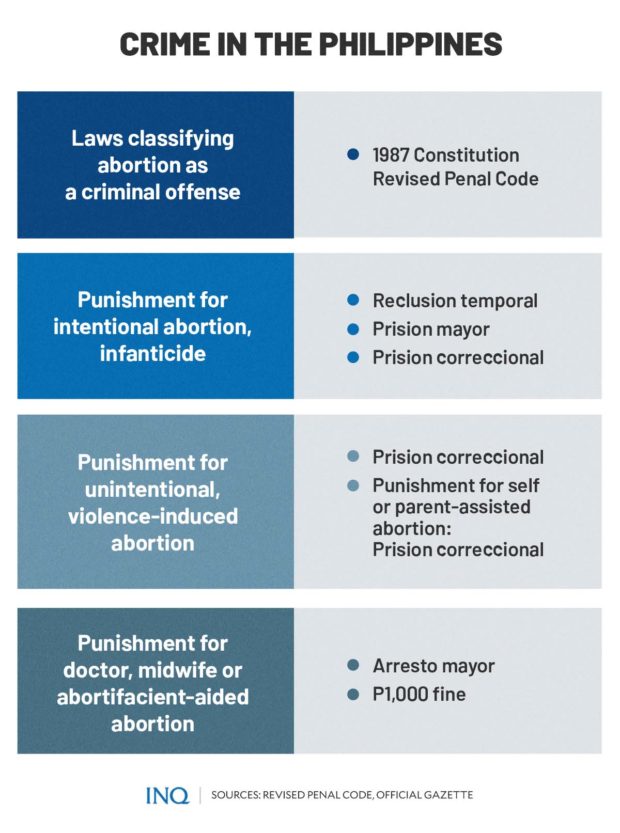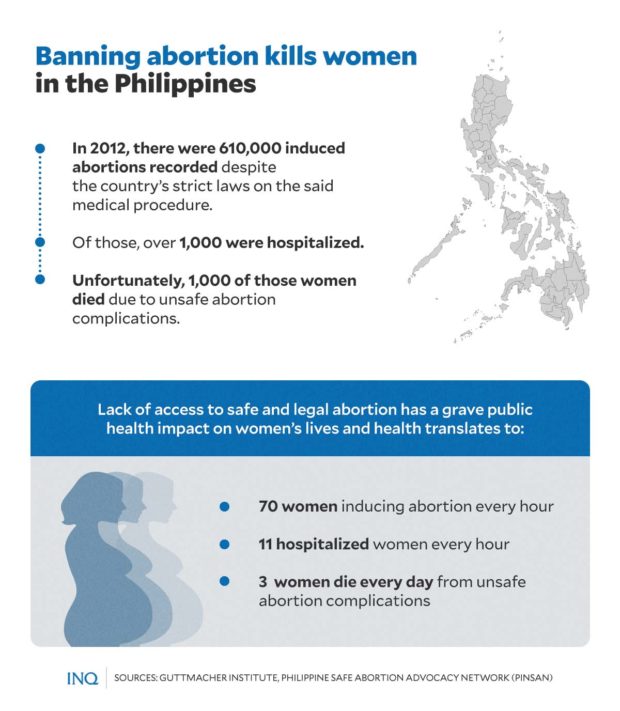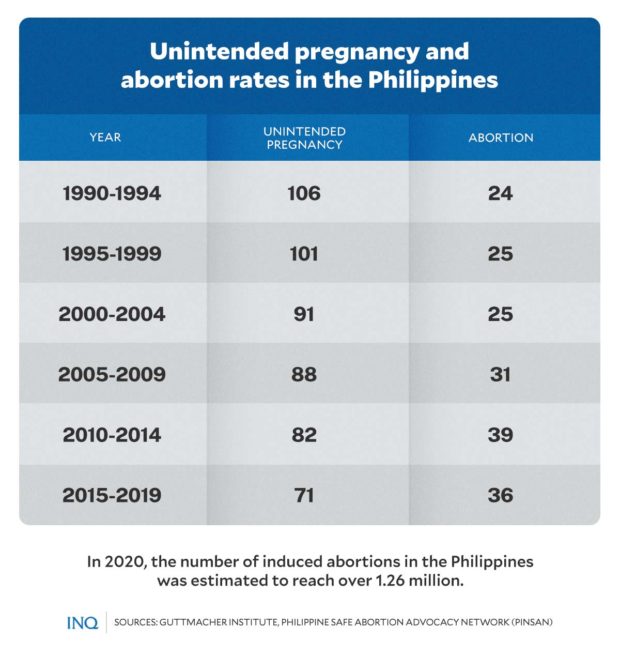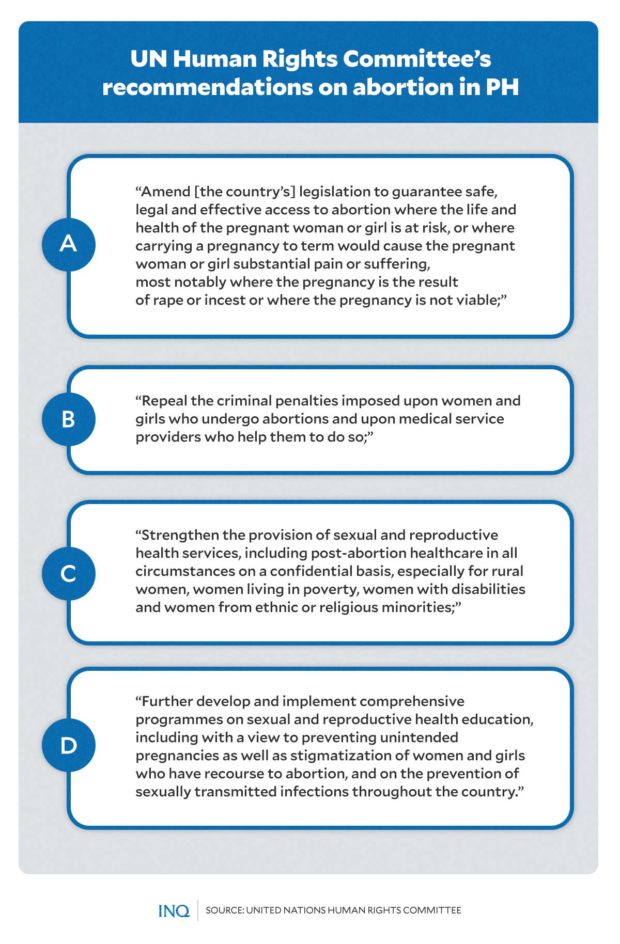UNHRC asks PH to decriminalize abortion as data show ban ineffective, deadly
MANILA, Philippines—The United Nations Human Rights Committee (UNHRC) called on the Philippine government to decriminalize abortion and improve sexual and reproductive health services such as post-abortion healthcare in the country.
UNHRC, in a recently released concluding observation at its 136th session, said it acknowledged the Philippines’ “efforts to reduce unsafe abortion and maternal mortality.”
These included conducting maternal death reviews and integrating family planning into other health programs.
However, UNHRC also stressed its longstanding concern over the criminalization of abortion in the Philippines, which pushes women to undergo induced, unsafe abortion services that endanger their lives and health.
In the country, where most of the population is Catholic, abortion is still not permitted, illegal, and punishable under the law.
The country’s current provisions on abortion are based on two legislations: Article II, Section 12 of the 1987 Constitution, and Articles 256-259 of the Revised Penal Code of the Philippines.
READ: PH’s restrictive abortion laws lead to unsafe abortion, deaths
UNHRC “also notes with concern information about the insufficient primary health care facilities and the significant increase in indirect obstetrical deaths during the COVID-19 pandemic, due in part to the lack of health care capacity.”
“It notes with concern the high number of unintended pregnancies, especially among adolescent girls,” it added.
UN recommendations on PH abortions
In its recommendations on the voluntary termination of pregnancy and reproductive rights in the Philippines, UNHRC noted that the government should revise laws to “guarantee safe, legal and effective access to abortion where the life and health of the pregnant woman or girl is at risk, or where carrying a pregnancy to term would cause the pregnant woman or girl substantial pain or suffering.”
“[M]ost notably where the pregnancy is the result of rape or incest or where the pregnancy is not viable,” UNHRC added.
It pushed for the repeal of criminal penalties imposed on women and girls who undergo abortions and medical service providers who help them to do so.
UNHRC also recommended improvements in sexual and reproductive health services “including post-abortion health care in all circumstances on a confidential basis, especially for rural women, women living in poverty, women with disabilities and women from ethnic or religious minorities.”
Comprehensive sexual and reproductive health education programs should also be further developed and implemented to prevent unintended pregnancies and stigmatization of women and girls who undergo abortion—as well as to avoid sexually transmitted infections.
Banning abortion kills Filipino women
In the Philippines, there were 610,000 induced abortions recorded in 2012 despite the country’s strict laws on the medical procedure.
Over 100,000 of those Filipino women who induced abortion that same year were hospitalized, according to a study by the Guttmacher Institute—a research group that supports access to abortion.
Unfortunately, 1,000 of those women died due to unsafe abortion complications.
According to the Philippine Safe Abortion Advocacy Network (PINSAN), the 2012 statistics show that lack of access to safe and legal abortion has a grave impact on women’s lives and health, translating to:
- 70 women inducing abortion every hour
- 11 hospitalized women every hour
- Three women die every day from unsafe abortion complications
- The figures have also continuously increased throughout the years, “proportionately with the increasing Philippine population.”
Between 2015 and 2018, PINSAN’s data showed that the number of abortions in PH has increased to 973,000 annually.
The increase continued through 2020, when it was estimated to reach over 1.26 million.
“The country’s restrictive laws on abortion have not prevented abortion and have only made it extremely unsafe, leading directly to the preventable deaths of thousands of women each year,” said PINSAN.
Why decriminalize abortion
“As long as abortion is restricted in Philippine law and people impose their religious morality on women seeking life-saving abortion care, women will die and suffer disability from complications from unsafe abortion,” lawyer Clara Padilla, spokesperson of PINSAN, said in a statement earlier this year.
Padilla, who is also the founder and executive director of EnGendeRights—a nonprofit organization that advocates for women’s rights—released this year a statement that listed over 20 reasons the Philippine government must decriminalize abortion.
Among these are:
- To save women’s lives and prevent disability from unsafe abortion complications.
- To reduce maternal deaths related to unintended/unwanted pregnancies and unsafe abortions during humanitarian crises, including the COVID-19 pandemic.
- To respect the woman’s personal decision.
- To repeal discriminatory laws against women and eliminate stigma, discrimination, and imposition of oppressive religious beliefs against women who induce abortion.
- To provide incest and rape survivors and sexually exploited/trafficked women the opportunity to end unwanted pregnancies through safe abortion procedures.
- To save the lives of adolescent girls, women with disabilities, and other persons at risk.
- To save the lives of poor women who are at risk due to lack of access to safe abortion.
- To save the lives of women with risky pregnancy conditions.
- To support the prevailing recognition that therapeutic abortion is legal to save the life of the woman and for medical necessity.
- To address unintended/unwanted pregnancies due to lack of access to contraceptives, contraceptive failure rates, and coercive relations.
Padilla also cited the social costs of the country’s lack of access to safe abortion and post-abortion care as one of the reasons the government must decriminalize abortion.
According to her, decriminalizing abortion could help the government save over half a billion pesos “since induced abortion services cost less than treatment of unsafe abortion complications.”
The other reasons cited by Padilla were:
- To uphold women’s fundamental human rights and confirm that women’s rights prevail over prenatal protection.
- To uphold women’s right to equal protection of the law.
- To uphold women’s rights to freedom of thought, conscience, and religion.
- To be in line with the global trend liberalizing abortion laws to lower maternal deaths and morbidities related to unsafe abortion complications.
- To ensure women’s access to wide-acting life-saving essential medicines.
- To adhere to the international health guidance of the WHO and the International Federation of Gynecology and Obstetrics to reduce maternal mortality due to unsafe abortion complications.
- To comply with international human rights standards.
- To ensure women’s access to safe abortion on all grounds since allowing abortion based only on certain exceptions will not suffice.
- To continue the historical fight to uphold women’s rights to equality and non-discrimination and respond to the outstanding clamor to pass the bill into law.
Padilla also cited the “constitutional guarantee on separation of church and state and non-establishment of religion.”
“Maintaining the restrictive abortion law would violate the principle of separation of church and state and would be tantamount to the establishment of religion—allowing certain religious groups to influence our laws, governance, and impose their beliefs on the entire Philippine population in violation of the constitutional guarantee on non-establishment of religion,” she said.
“This would infringe on the right to freedom of religion of women and health providers who want to provide health care to their patients,” she added.
Read the full statement here:
Padilla, along with PINSAN, also drafted a bill to decriminalize abortion, which further discussed key points and reasons that the government must lift penalties imposed for the medical procedure.
Read the draft of the proposed bill here:
“We believe that this proposed bill will save women’s lives when passed. The country’s restrictive laws on abortion have not prevented abortion and have only made it extremely unsafe, leading directly to the preventable deaths of thousands of women each year,” PINSAN said in a statement released on June 2020.
“We at PINSAN would like to encourage sincere and good faith discussions on the abortion situation in the country, discussions based on facts and evidence that are sound, scientific, and, most importantly, sensitive to the needs and experiences of women, girls, and other gender identities with reproductive capacities at various, intersecting vulnerabilities—including physical, mental, and socio-economic vulnerabilities, among others,” the organization added.
“We believe it is high time the Philippine government decriminalize our antiquated and restrictive law on abortion, in compliance with its international human rights obligations and women’s right to equality and non-discrimination.”




